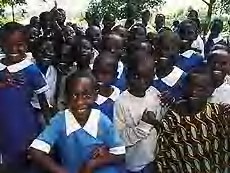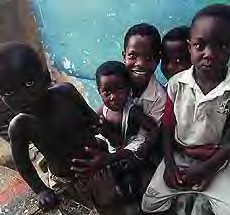 |
 |
Premise:
Support for NEPAD
through the TICAD process.
Clear Achievement: Promise and realisation of assistance worth 90
billion yen over a five-year period in the fields of basic human needs.
(Assistance amounting to 93,345,000,000 yen was
already realised by the end of September 2003.
*For the details of assistance projects, please refer to "ODA
for Real Fruition".) |

Human Resources Development
and Information Communication Technology (ICT)
"Human resources development is the foundation of nation-building":
Japan will utilize actively US $2 billion of its ODA to African countries
in the field of education sector. It also plans to promote use of
ICT in education, health and other fields.
Water
"Providing safe drinking water to people": Japan has launched
a grand aid for water security, which will be used to support areas
including Africa. Japan will provide assistance for capacity-building
for approximately 1,000 people, including African nationals over the
five-year period from FY 2003.
Health-Care and Medical Issues
For the future of children, Japan will aim to provide funding of approximately
US $80 million through 2005 for polio eradication in Africa and elsewhere
in the world. Japan will also continue to implement the "Okinawa
Infectious Diseases Initiative".

|
 |

Food, Agriculture, and
Rural development
Food aid by Japan includes the extension of US $ 30 million in assistance
to combat the food crisis in Southern Africa. Japan also supports
the research, production, and dissemination of the NERICA
rice, contributing thus to food security. Japan also promotes rural
development with citizen participation.
Infrastructure
Continued support for developing infrastructure, as shown by Japan�s
commitment of approximately US $ 1.06 billion in assistance to Africa
over the next five years in four infrastructure sectors: transportation,
communication, energy and water.
Promotion of Trade and Investment
With a view to facilitating investment by Japanese companies in developping
countries, Japan will utilize overseas investment loans. Its targeted
amount including for Africa is about US$ 300 million for the next
five years.
Debt Relief Program
Japan will forgive the debts of HIPCs and other eligible countries
in Africa by cancelling yen-loan ODA amounting to approximately US
$3 billion.
Support through Multilateral Development
Banks
Japan, through its contribution to Poverty Reduction Strategies Trust
Fund at the World Bank and other measures, supports the formulation
and implementation of Poverty Reduction Strategy Paper. |
 |

Support for Revitalizing
Conflict-torn Communities and Domestic Reconciliation
Japan promotes efforts towards the consolidation of peace, in cooperation
with international organizations and civil societies, such as "Grand
Aid for Conflict Prevention and Peace Building", utilization of "Trust
Fund for Human Security", etc.
Supporting Efforts by African Countries to
Resolve Conflict (Peace-Making Process)
Japan continues to support activities of African regional organizations
including the African
Union (AU) and the Economic Community of West African States (ECOWAS)
in the areas of conflict prevention, management and resolution.
 |
| Essay
Renewed Perspective:"Human Security" |
|
"Human
security" is a new focal point of Japan's assistance
programs for Africa. Human life and dignity are
threatened by various issues such as forced displacement
caused by conflicts, and the increasing risk of
infectious diseases against the backdrop of globalization.
The "human security" thus aims to cultivate
problem resolving ability on individual and community
levels to secure the people from these threats.
In March 1999, the Government of Japan founded the
"Trust Fund for Human Security" within
the UN to support various projects promoted by UN
organizations aiming to eliminate a variety of problems
such as landmines, refugees, and infectious diseases
including AIDS. To date (as of August 2003), it
has spent approximately $ 19,000,000 as aid for
Africa through the Trust Fund.
In Africa, the materialization of "human security"
is key in many areas, from armed conflicts to development.
In particular, in African countries following a
time of armed conflict, what is needed in the process
of the re-building of the country-from humanitarian
assistance to the reconstruction of infrastructure-is
to collect the strength and wisdom of the people
concerned, heal the communities destroyed by the
conflict, and go forward toward creating a new society. |
|
 |
For
example, the reintegration of former soldiers into
the society is a big problem to be solved in a post-conflict
Sierra Leone. It is essential for former soldiers
to be accepted into local communities, to have job
trainings, and to live a new life through their
participation in the society in order to cultivate
mutual respect and reliance among the citizens.
Japan has spent a total of $ 3,090,000 as an aid
program conducted by the UNDP with cooperation from
local societies for job-training projects for former
soldiers, and it is highly praised by the people
in the concerned areas.
The "human security" perspective, which
places an emphasis on individuals and their communities,
thus became an important and characteristic part
of Japan's cooperation for Africa. |
|
|
|

[ BACK
] |
 |